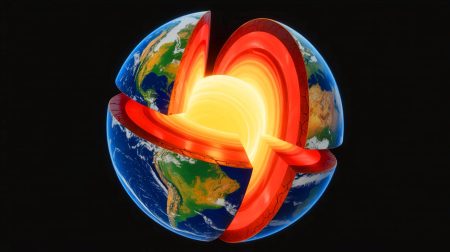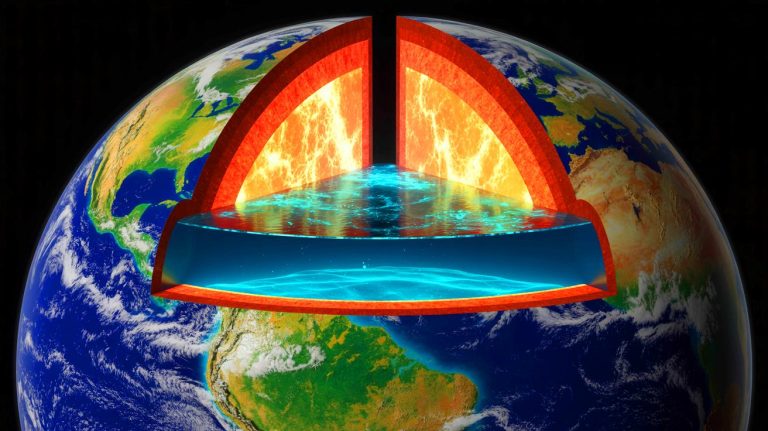| IN A NUTSHELL |
|
In a world where scientific discoveries continue to reshape our understanding of the universe, a groundbreaking finding has emerged from beneath our very feet. Scientists have uncovered a massive underground ocean of water locked within the Earth’s mantle, a discovery that could redefine our understanding of the planet’s water cycle. Unlike traditional bodies of water, this hidden ocean exists in a unique state, trapped within a mineral called ringwoodite, far beneath the Earth’s surface. This remarkable revelation has sparked curiosity and excitement among researchers, as it offers new insights into Earth’s geophysical systems and the potential origins of surface water.
The Astonishing Depths of the Hidden Ocean
Located nearly 400 miles beneath the Earth’s surface, the hidden ocean is an awe-inspiring geological feature. This vast reservoir of water is not in a liquid form as we know it, but rather suspended within ringwoodite, a mineral capable of trapping water due to its unique crystal structure. Geophysicist Steve Jacobsen, a leading researcher in the study, describes ringwoodite as a sponge that soaks up water, holding it securely within its matrix. This discovery challenges previous assumptions about the Earth’s interior and suggests that the planet’s mantle is far wetter than previously thought.
Ringwoodite’s ability to trap water is significant because it implies the existence of a whole-Earth water cycle that extends deep into the mantle. The implications are profound, indicating that the Earth’s interior may play a crucial role in the distribution and movement of water on the planet. As scientists continue to explore this hidden ocean, they are uncovering new clues about the dynamic processes that shape our world and the origins of the vast oceans that cover its surface.
Anurag Bajpayee’s Gradiant: Engineering the Future of Industrial Water
Unveiling the Discovery Through Seismic Waves
The journey to uncover this hidden ocean began with the analysis of seismic waves generated by earthquakes. Researchers observed that these waves, when passing through the Earth’s mantle, behaved in unexpected ways, suggesting the presence of water locked within the rock. By meticulously studying the patterns of these seismic waves, scientists were able to map the location and extent of the water trapped in ringwoodite. This innovative approach provided the first tangible evidence of a vast underground water reservoir, hidden from view yet integral to the planet’s balance.
To visualize the scale of this subterranean water body, consider that if just 1% of the ringwoodite contained water, the volume would be three times greater than all the oceans combined. This staggering estimate has captivated scientists and the public alike, as it points to a previously unimagined abundance of water within the Earth’s mantle. The discovery underscores the importance of seismic studies in revealing the hidden secrets of our planet and highlights the interconnectedness of Earth’s geological and hydrological systems.
The Implications for Earth’s Water Cycle
The discovery of a hidden ocean beneath the Earth’s surface holds profound implications for our understanding of the planet’s water cycle. Traditionally, water on Earth has been viewed as a surface phenomenon, circulating between the oceans, atmosphere, and land. However, the realization that vast amounts of water are stored deep within the mantle suggests that the water cycle is more complex and extensive than previously thought. This newfound understanding could help explain how water first arrived on Earth and how it has been distributed over geological time.
Geophysicists like Steve Jacobsen believe that this hidden reservoir may play a crucial role in the movement of water from the mantle to the surface, potentially influencing volcanic activity and tectonic processes. By studying the interactions between surface water and deep mantle water, scientists hope to gain insights into the forces that drive Earth’s dynamic systems and the origins of the planet’s abundant water resources. This discovery represents a paradigm shift in our understanding of Earth’s hydrology and opens new avenues for research into the planet’s history and future.
The Broader Implications of Subterranean Water
Beyond its impact on our understanding of Earth’s water cycle, the discovery of subterranean water has broader implications for geology and planetary science. The presence of water within the mantle could influence the behavior of tectonic plates, the formation of magma, and the occurrence of earthquakes. By releasing water into the atmosphere during volcanic eruptions or through rock metamorphism, these hidden reservoirs contribute to the global water cycle and affect climate patterns.
This revelation also prompts reconsideration of planetary habitability beyond Earth. If water can be stored deep within the mantle of our planet, similar processes could occur on other rocky planets, potentially supporting the existence of water in unexpected places. As scientists continue to explore the mysteries of Earth’s interior, they are reminded of the boundless complexities that define our planet and the universe. What other hidden secrets lie beneath the surface, waiting to be discovered?
As we marvel at the discovery of a hidden ocean beneath our feet, we are reminded of the mysteries that still await exploration on our planet and beyond. This revelation challenges our understanding of Earth’s water cycle and opens new doors for scientific inquiry. Could this discovery reshape our understanding of Earth’s history and the forces that shape our world? What other secrets does the Earth hold, hidden beneath its surface, waiting to be revealed by the curious and determined minds of researchers? The answers lie in the depths, waiting to be uncovered.
Did you like it? 4.6/5 (27)









This is incredible! Does this mean we have to rewrite all the geology textbooks? 🌍📚
So, is the core made of water now?
Wait, are we talking about an actual ocean or just some water trapped in rocks? 🤔
Could this hidden ocean have any impact on climate change? 🌡️
This is fascinating! How long did it take for scientists to make this discovery?
How does this affect our understanding of water distribution on Earth?
What are the chances of this hidden ocean being accessible or usable by humans?
Mind-blowing discovery! Thanks for sharing this amazing piece of science news.
Does this discovery mean there’s a chance of finding life forms deep underground? 🦠
Thanks for the article, but I’m skeptical. How can we be sure of this finding?
Great article! I can’t wait to see what other surprises our planet has in store. 🌎
Are there any immediate practical applications from this discovery?
Wow, this is huge! How might this affect earthquake research?
OMG, are we going to find Atlantis next? 😂
Would love to know more about the technology used to discover this. 🔍
I’m curious how this could influence volcanic activity. Anyone know?
This changes everything we thought we knew about Earth’s water cycle! 🌊
Can we expect more discoveries like this in the near future?
Such a cool discovery! But why haven’t we found this sooner?
If this is true, it could be a game-changer for geology.
This is just mind-blowing! How much more water is down there? 💧
Did the article mention how they analyzed the seismic waves? 🤓
How does this discovery impact our search for water on other planets?
This sounds like something out of Jules Verne’s novels! 📖
Why isn’t this front-page news everywhere? It’s amazing!
This was first published in June 2014. ELEVEN years ago. Click bait!
How reliable is the data on this hidden ocean? I’d love to see more evidence.
What about the environmental impact of tapping into such water resources? 🌐
Could this discovery help us understand the origins of Earth’s oceans?
Awesome read! It’s incredible how much we still have to learn about our planet.
Anyone else concerned about what else might be lurking down there? 😱
Is there any risk of this hidden water affecting surface water levels?
How does this affect our understanding of planetary habitability? 🪐
Is this discovery unique to Earth, or could other planets have similar features?
Seems like a good plot for a sci-fi movie. Maybe Atlantis is real after all! 🧜♂️
The implications of this discovery are vast. Can’t wait to learn more! 🌐